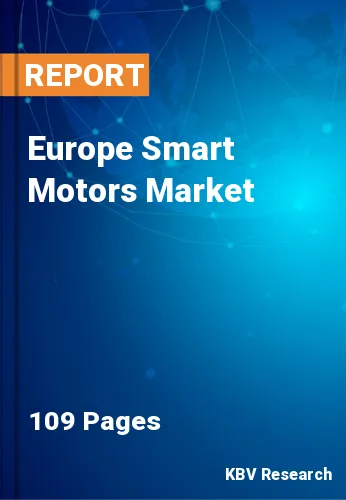
The Europe Smart Motors Market would witness market growth of 6.5% CAGR during the forecast period (2023-2030).
The rapid advancement of technology, including sensors, microcontrollers, wireless communication protocols, and data analytics tools, has made smart motor solutions more accessible, affordable, and scalable than ever before. Moreover, continuous tracking, analysis, and optimization of operational processes are made possible by the seamless connection, interoperability, and data exchange made possible by integrating Industry 4.0 principles and IoT (internet of things) technologies into smart motor systems. The increasing demand for automation, digitalization, and process optimization across industries is driving the adoption of smart motors as integral components of smart factories, automated production lines, and interconnected supply chains.
Furthermore, it offers superior performance, reliability, and durability compared to traditional motor systems due to advanced features such as fault detection, condition monitoring, and self-diagnostic capabilities. By continuously monitoring operational parameters and detecting anomalies in real-time, it enables early detection of potential issues, preventing equipment failures and minimizing costly downtime associated with unplanned maintenance and repairs. In an increasingly competitive marketplace, organizations that embrace smart motor technologies gain a competitive edge by offering innovative solutions that deliver superior performance, efficiency, and reliability. It enables organizations to differentiate their products and services, meet evolving customer demands, and capitalize on emerging market opportunities driven by trends such as electric vehicles, renewable energy, and smart infrastructure.
The expansion of the electric vehicle industry in Belgium increases the demand for smart motors used in propulsion systems and creates opportunities for diversifying smart motor applications. As per the same source, in 2022, passenger EV sales in Belgium increased by 39.7 percent year-over-year to 98,356 units, representing an EV penetration rate of 26.9 percent of total new passenger vehicle sales. Battery EV (BEV) sales increased by 72.1 percent year-over-year to 37,815 units. Plug-in hybrid EV (PHEV) sales grew 25 percent to 60,541 units. Therefore, the expansion of the EV industry and growing government funding for smart manufacturing are driving the market’s growth.
The Germany market dominated the Europe Smart Motors Market, by Country in 2022, and would continue to be a dominant market till 2030; thereby, achieving a market value of $208 Million by 2030. The UK market is registering a CAGR of 5.6% during (2023 - 2030). Additionally, The France market would showcase a CAGR of 7.3% during (2023 - 2030).
Free Valuable Insights: The Global Smart Motors Market will Hit USD 3.3 billion by 2030, at a CAGR of 6.7%
Based on End-use, the market is segmented into Industrial, Automotive, Consumer Electronics, Aerospace & Defense, and Others. Based on Product, the market is segmented into 24V, 48V & above, 18V, and 36V. Based on countries, the market is segmented into Germany, UK, France, Russia, Spain, Italy, and Rest of Europe.
By End-use
By Product
By Country
Our team of dedicated experts can provide you with attractive expansion opportunities for your business.
